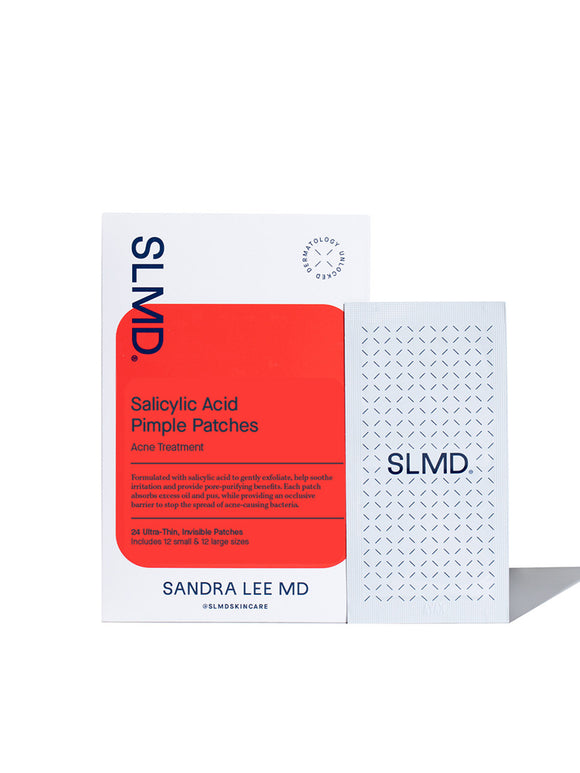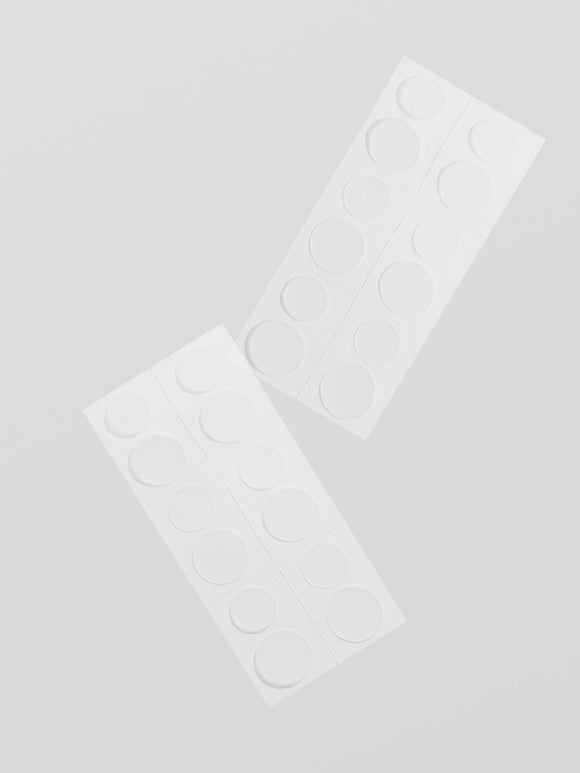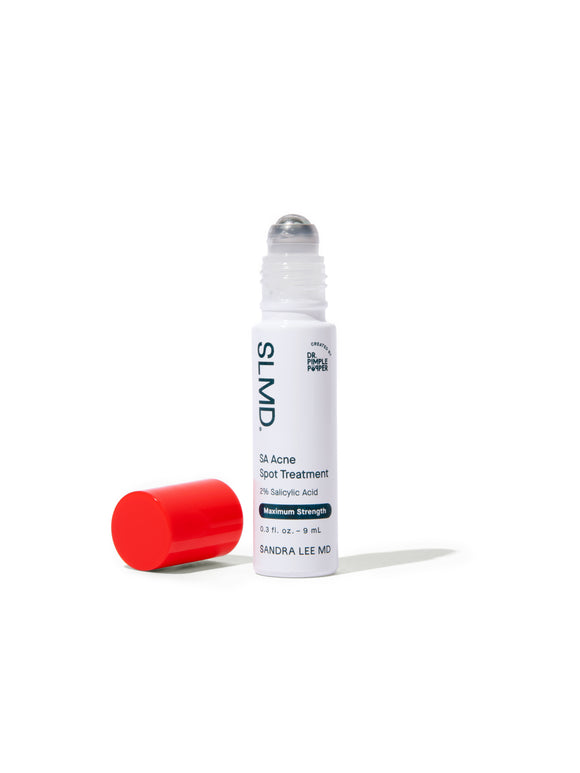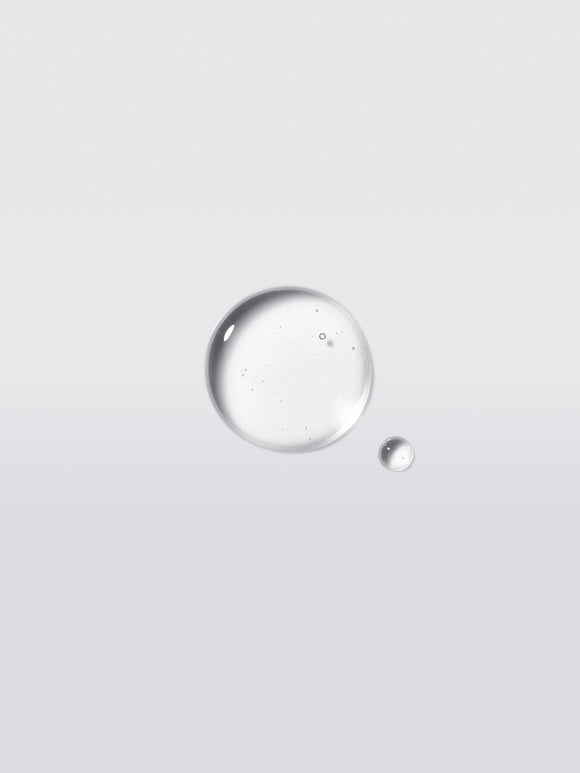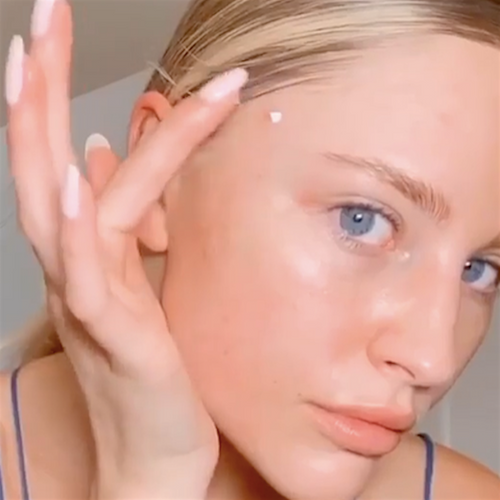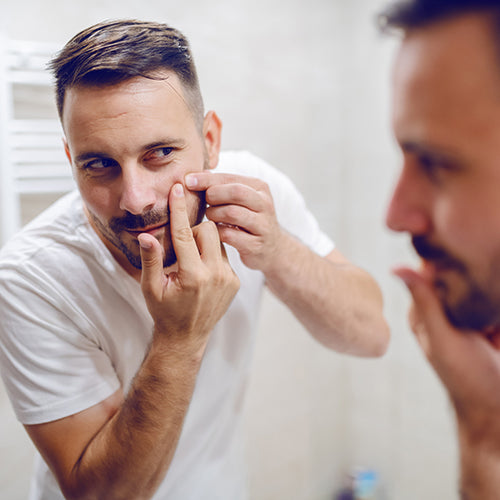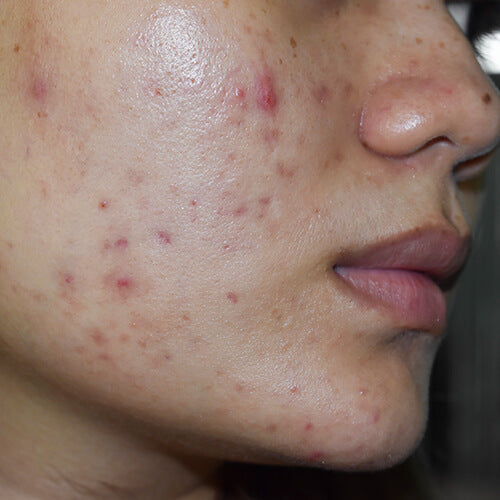
Can You Wear Acne Patches in Public? Dr. Pimple Popper Weighs In
Find out her expert opinion on treating your acne at work, running errands — even on a first date.
Published:
5 minute read
Sporting acne stickers in public is officially a mainstream trend, and we're here to report that celebrities are helping to push the movement. The likes of Florence Pugh and both Hailey and Justin Bieber have all been photographed embracing this acne treatment trend.
But what about the rest of us? Is it cool to dash to the store, show up to a party, or even rock a patch while giving a work presentation? When it comes to visible skincare, the line between private and public life has blurred, and acne care is no exception.
To provide a definitive answer, we consulted the acne expert, dermatologist Sandra Lee, MD (aka Dr. Pimple Popper), to see where she stands on wearing pimple patches out in public, and to get her advice on the specific social situations that cause the most anxiety.
Fast facts: pimple patches in public, work, and dating
- Wearing pimple patches in public is an act of self-care and solidarity
- Use salicylic acid patches for discreet daytime wear at work or social events
- A pimple patch is a hygienic covering and is entirely professional
How do pimple patches actually work?
Let’s start with why you even need acne patches on your radar. If you’re new to the world of “zit stickers,” be sure to check out Dr. Pimple Popper’s comprehensive guide that covers everything you need to know.
Acne patches are pieces of adhesive film designed to protect and heal pimples. They come in two main varieties:
- Hydrocolloid: Thicker and gel-filled to absorb fluid and pus (best used overnight or on pimples that have come to a head).
- Non-hydrocolloid (or active ingredient): Thinner, sometimes translucent, and often designed to be more discreet.
Both varieties of acne patches can contain active ingredients — like salicylic acid or benzoyl peroxide — to help reduce inflammation and shrink the pimple.
“Pimple patches are very effective for keeping your fingers away, which is critical to promote faster healing,” says Dr. Lee.
Dr. Pimple Popper tip: "Make sure your face is clean and completely dry before you apply a pimple patch. Not only will the active ingredients penetrate better, but the patch will stick much more reliably."
Try: SLMD Salicylic Acid Cleanser, SLMD Salicylic Acid Pimple Patches
The history of the acne patch trend
According to Dr. Lee, this trend isn't exactly new. While social media started championing acne positivity years ago, the movement has gained significant momentum in the last few years. This shift (spurred by video calls and a more casual attitude toward appearance) started blurring the lines between what was considered private versus public. Acne care was no exception: suddenly, many people stopped caring so much about keeping their skin flaws secret.
Skincare junkies know that wearing pimple patches in public goes back even further, to the 2010s in South Korea. There, hydrocolloid stickers were normalized early on as part of a well-rounded acne routine. When K-beauty exploded globally, acne patches came along for the ride.
Dr. Pimple Popper's Acne Patch Care
Is wearing pimple patches unprofessional? (addressing anxiety)
You can probably guess where we stand: it’s perfectly acceptable to wear acne treatment patches out in public. Acne is the most common skin condition in the world. There’s not only no shame in treating pimples, it’s a sign you’re skin savvy and prioritizing your health.
Pimple patches have a protective effect against both prying fingers and environmental pollutants. It only makes sense to safeguard your skin from those free radicals as it heals.
Dr. Lee says she’s noticed another positive impact from the pimple patch trend: helping to remove the stigma of having acne in the first place. “Anytime people feel empowered to take control of their skin health, that’s a win,” she says. “Acne patches can be a sign of solidarity — a way of saying, acne is human, and we can do something about it.”
Pimple patches at the office or for an interview
In corporate or professional settings, the debate over wearing visible pimple patches at work is often most intense. Some worry that a visible patch is "unpolished" or inappropriate, but Dr. Lee views this standard as outdated.
The expert view is this: "A pimple patch is, fundamentally, a bandage," explains Dr. Lee. "Acne is a wound on the skin, and covering it is an act of hygiene. It stops you from picking, prevents infection, and promotes faster healing."
The bottom line: everyone's workplace is different. Use your best judgement for important presentations or meetings, but know that you are treating a skin condition, and that is never unprofessional.
Are pimple patches okay for a first date or social event?
In casual and social settings, the judgment is minimal, especially among younger generations who see the trend as self-care. On a first date, a pimple patch can serve as an interesting filter: anyone who judges you negatively for wearing one likely isn't the right fit for you anyway.
However, if you feel self-conscious, look for thin, transparent patches containing active ingredients like salicylic acid. These allow you to treat the spot discreetly under light makeup or worn bare.
If you are dealing with recurring acne, Dr. Lee recommends seeking out a comprehensive routine to address breakouts at every stage.
Dr. Pimple Popper tip: "Choose your patch based on the breakout. If the spot needs absorbing power, use a hydrocolloid. If you need a patch to treat a growing blemish during the day, a subtle, clear salicylic acid patch is ideal. Always trust your instincts on what you feel comfortable wearing."
Dr. Pimple Popper answers your acne patch questions
Q: Are pimple patches better than spot cream?
A: Pimple patches offer a unique benefit by creating a physical barrier to prevent picking and seal in a healing environment. You can even "double up" on protection by layering a non-greasy, liquid treatment under your patch. Try: SLMD SA Acne Spot Treatment
Q: Can I put makeup over pimple patches?
A: Yes, you can apply makeup over most thin, clear pimple patches. However, it is best to avoid makeup entirely to keep the patch as sterile as possible and to maximize healing benefits.
Q: How long should I wear a pimple patch for?
A: A patch should be worn for at least 6–8 hours, or until it has changed from clear to a cloudy white color. Reapply as needed, per the label instructions.

Dr. Lee's Last Word
I’m all for people wearing acne patches when they’re out and about,” says Dr. Lee. “In fact, I’ve been known to head to the grocery store with one of my Spot Check patches on…I love them because they’re so thin and they have a matte finish so you can almost not see them.



